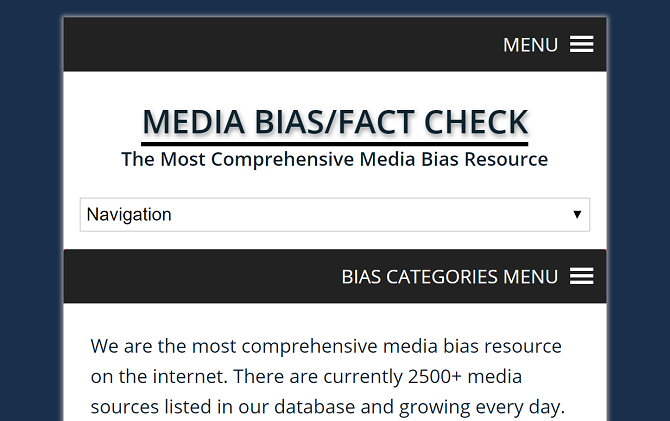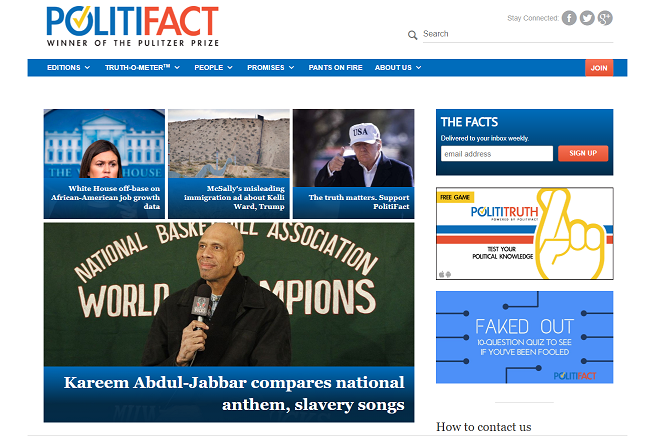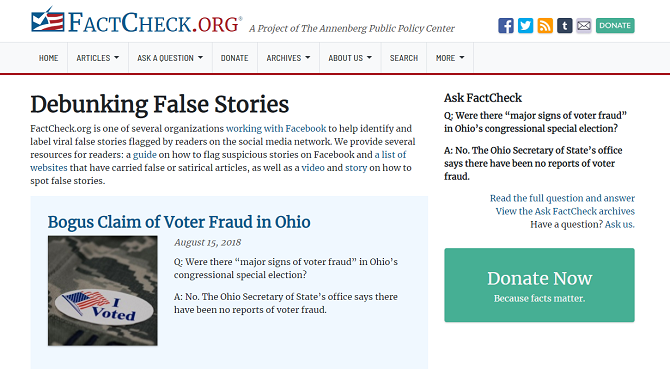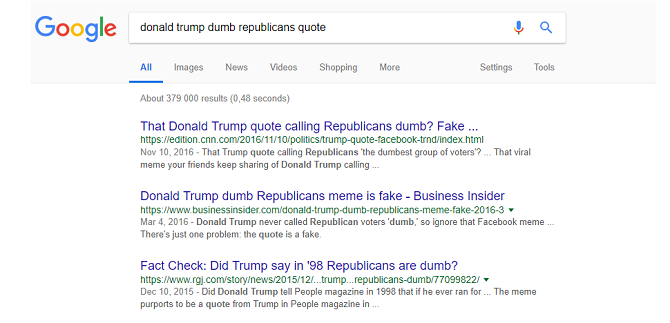

Fact checking has its origin in the early 20th century when magazines began to verify statements made in non-fictional texts prior to publication. But the impact of fake news has soared in recent years. This means that ordinary people are increasingly skeptical of what they read online and hear from others.
So in the age of misinformation and fake news, how do you check your facts? Here are five of the best fact-checking websites so that you can find the truth.
1. Media Bias/FactCheck (MBFC News)

If you were wondering who is there to fact check the fact checkers, that would be MBFC. The website is a bias rating resource and even news apps and extensions like CivikOwl integrate these ratings into their own systems. The site’s reputation means that it has long been a resource that internet users can visit to check the bias in their favorite news websites.
MBFC not only includes reports on the bias of famous fact-checking websites like Snopes and Politifact but also publishes a daily source bias check. It takes into account its own methodology, as well as reports from users. Factors that they consider include sourcing, biased wording, story choices, and political affiliation. If you want a claim checked that hasn’t been covered by other sites, you can submit a request on MBFC.
The site analyzes bias and funding sources and also checks how factual a site’s content is overall. For example, the Washington Post received a bias rating of “left-center”, but a high factual reporting score. This is because while they publish factual information, MBFC says loaded words are used in reporting.
Meanwhile, Fox News is listed as having a right bias and a mixed rating for factual reporting.
Finally, MBFC also has extensive lists on news sources with different biases (right, extreme, left, etc). This includes lists of websites known for conspiracies, pseudoscience and questionable sources.
We’ve included the MBFC News bias rating on each of the fact-checking sites on this list.
2. PolitiFact

MBFC News Rating: Least Biased
PolitiFact is a non-partisan fact-checking website that focuses on claims made in the political sphere in the US. This includes statements by politicians, political topics such as immigration, and general news. A global edition of the site tackles stories from other parts of the world.
PolitiFact is a Pulizter Prize-winning website and was acquired by the Poytner Insitute in 2018—a reflection of the site’s commitment to quality, truthful journalism.
The website has a few unique elements that make it stand out from other fact-checking websites. Firstly, there’s the Truth-o-Meter, which assesses the level of truth in a statement. This scale includes levels such as true, half true, mostly false, and even a “pants on fire” rating at the far end of the meter. The site even has an affiliated app called PolitiTruth that aims to test your political knowledge and susceptibility to fake news.
3. Snopes

MBFC News Rating: Least Biased
Snopes started out as a site that mainly dealt with urban legends, myths, common misconceptions, and rumors. However, it has expanded to encompass general fact-checking of viral misinformation, including political statements.
Snopes has been accused of being left-leaning and receiving funding from liberal billionaire George Soros. However, its founder David Mikkelson says all the site’s revenue comes from Facebook advertising.
Meanwhile, FactCheck.org has put its weight behind Snopes; saying it is a reliable source and frequently citing the website in their own fact-checking articles. Meanwhile, CivikOwl gives the site a rating quality of “high”.
Its media bias rating is “center”, which according to AllSides.com “means the source or person rated does not predictably show opinions favoring either end of the political spectrum, conservative or liberal”. So despite the occasional detractors, the site holds a high reputation in the fact-checking community.
4. FactCheck.org

MBFC News Rating: Least Biased
Not only is FactCheck.org a fact-checking website with an established history of journalistic rigor, but it is also one of the partners Facebook has recruited to combat viral fake news.
FactCheck is a non-partisan fact-checking website which focusing primarily on US politics. It is also a non-profit project run by the Annenberg Public Policy Center of the University of Pennsylvania—meaning its focus is on information, not the pursuit of profit.
Not only does the site regularly debunk politician claims and viral fake news, but it also lets users submit their own questions to the website.
5. Google Search

Google’s search engine can help you find the truth. However, it takes a critical eye to distinguish truth from fiction, especially when digging through hundreds of search engine results. You’ll need to make sure that you’re getting your information from a trustworthy news website and not some conspiracy blog.
However, when it comes to search engine results, there’s also the problem of confirmation bias. People are more likely to lend credence to results that confirm their preconceptions rather than ones that contradict it. This includes clicking on that one search result from a random, unverified source and believing what it has to say, versus the results from sources with verified facts.
Nevertheless, a search engine is a good start. When you are checking facts for your homework, try Google Scholar to find scholarly literature on Google Books.
Google’s snippet previews and information from Google Assistant can also answer questions for users looking for clarification on a topic.
Fact-Checking Is Evolving
As the ways to spread misinformation become more accessible and effective, the news industry and journalists constantly need to find new ways to keep the public informed.
Even blockchain technology is being brought into the mix. We are now seeing the dawn of decentralized news networks and peer-reviewed content. Find out more about this new horizon in the era of news in our piece on how blockchain is changing the media.
Read the full article: The 5 Best Unbiased Fact-Checking Sites for Finding the Truth

